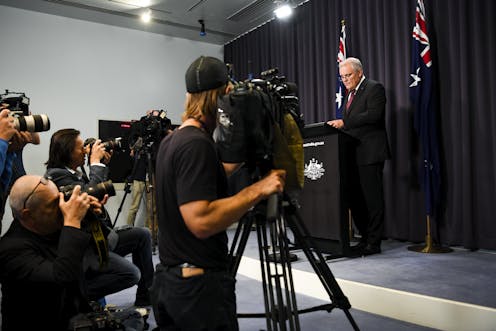10 years after Finkelstein, media accountability in Australia has gone backwards
- Written by Denis Muller, Senior Research Fellow, Centre for Advancing Journalism, The University of Melbourne

In September, it will be ten years since the Gillard government established the Independent Inquiry into Media and Media Regulation in Australia, otherwise known as the Finkelstein inquiry. In the succeeding decade, media accountability in Australia has, if anything, got weaker.
The latest sign of this is the decision last week by the journalists’ union, the Media, Entertainment and Arts Alliance, to quit the Australian Press Council.
The MEAA said in its announcement that Australia’s media regulatory framework had failed to keep up to date with the effects of media convergence. It also said its members had become increasingly frustrated by the council’s inconsistent adjudications and poor governance.
The MEAA represents about 5,000 of Australia’s journalists.
It said the press council had lost credibility with journalists, and even with the publishers who make up its membership. This had been shown by the way adjudications were mocked or ignored.
Media regulation in Australia has always been weak, fragmented and lacking in public visibility. Even before the internet age, it was fractured along ownership, industrial and technological lines.
The Australian Press Council is the accountability body for the newspaper publishers and their online platforms – though not individual journalists. The accountability body for commercial radio and television and their online platforms is the Australian Communications and Media Authority, though once again not for individual journalists or broadcasters.
Neither of these bodies has any credibility among journalists. As the MEAA said in its announcement, its members are more concerned about getting a going-over on ABC TV’s Media Watch program than about anything the formal regulators do.
Journalists told me the same thing as long ago as 2003, when I was researching my doctoral thesis on the issue. “No one wants a guernsey on Media Watch,” one respondent said, echoing the sentiments of many.
It is easy to see why. Media Watch names and shames, and does so weekly. It is highly visible and fiercely independent, giving the ABC as much scrutiny as anyone else.
By contrast, the Press Council and the ACMA processes are sluggish and opaque, and their sanctions are derisory – or at least the use of them is. The press council’s only sanction is a negative adjudication, which many newspapers place as far back in the paper as possible under a jam-label heading such as “Press Council Adjudication No 1357”. Not a verb in sight.
As for the ACMA, it turns itself inside out trying to find ways to excuse bad behaviour by broadcasters. So even though it has powers to impose licence conditions on broadcasters or suspend or cancel a licence, it seldom uses them.
A good example was the way the ACMA handled the grotesque conduct of some Australian commercial television channels in their coverage of the Christchurch massacre in March 2019.
It found Australian television broadcasters screened discrete excerpts of the terrorist’s bodycam footage, and that some also included survivor mobile phone footage that showed dead and injured people inside the Linwood Islamic Centre.
Read more: Media watchdog's report into Christchurch shootings goes soft on showing violent footage
Its sanction? To have “a productive conversation” with the television industry about whether its codes were adequately framed to deal with this type of material in the future. The answer to that question was clearly “no”, although the code had been signed off by the ACMA.
The whole episode was typical of the ACMA’s approach over many years.
In New Zealand, meanwhile, the Broadcasting Standards Authority found Sky News New Zealand’s use of clips taken from the terrorist’s bodycam footage was in breach of the broadcasting standards governing violence and law and order. It found the degree of potential harm that could be caused to audiences was greater than the level of public interest, and imposed $NZ4000 in costs against the broadcaster.
It is notable Sky News NZ took its feed from Sky News Australia.
The Finkelstein inquiry proposed a statutory authority to run a unified system of media accountability covering all media. It was howled down as tyrannical by the media organisations, and went nowhere.
The contemporaneous inquiry in Britain by Lord Leveson, following the phone-hacking scandal embroiling Rupert Murdoch’s News International newspapers there, proposed a statute-based system. That, too, fell foul of media antagonism and government gutlessness.
More recently, in 2019 the Australian Competition and Consumer Commission recommended what would require a statute-based unified accountability mechanism as part of the government’s response to the challenges posed by the global tech giants such as Google and Facebook.
This recommendation has been sedulously ignored by the federal government, even though it has implemented the recommendation that the global platforms should pay Australian media organisations for news the platforms take.
At the present time, the Senate Environment and Communications References Committee is inquiring into media diversity in Australia. The issue of media accountability has been a recurring theme in the submissions sent to it.
What will come out of the inquiry is yet to be seen. But given the present government’s track record, especially concerning its relationship with News Corporation, it would be surprising if any recommendation to strengthen the existing threadbare system were to result in substantive policy action.
Authors: Denis Muller, Senior Research Fellow, Centre for Advancing Journalism, The University of Melbourne



















